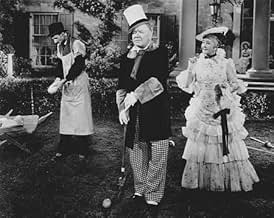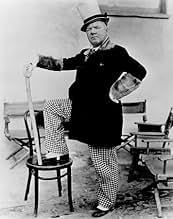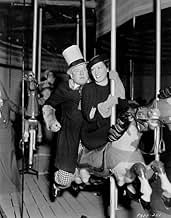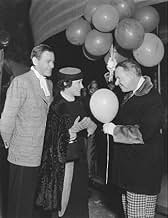Ajouter une intrigue dans votre langueCarny con artist and snake-oil salesman Eustace McGargle tries to stay one step ahead of the sheriff but is completely devoted to his beloved daughter Poppy.Carny con artist and snake-oil salesman Eustace McGargle tries to stay one step ahead of the sheriff but is completely devoted to his beloved daughter Poppy.Carny con artist and snake-oil salesman Eustace McGargle tries to stay one step ahead of the sheriff but is completely devoted to his beloved daughter Poppy.
- Réalisation
- Scénario
- Casting principal
- Countess Maggi Tubbs DePuizzi
- (as Catharine Doucet)
- Carnival sword swallower
- (non crédité)
- Boy
- (non crédité)
- Bit part
- (non crédité)
- Young woman
- (non crédité)
- Gardener
- (non crédité)
- Bartender
- (non crédité)
- BIT part
- (non crédité)
Avis à la une
It's true that the sentimental narrative, romantic subplot and even a couple of songs get in the way of the comedy highlights, but Fields himself is in fine form here (he originated the role of Professor Eustace McGargle on stage and had already appeared in a Silent version of the Dorothy Donnelly play called SALLY OF THE SAWDUST [1925] - directed, of all people, by D.W. Griffith and, for this reason, making it one of the very few Fields Silents released on DVD!). Incidentally, the star was seriously injured during the making of POPPY - not that his performance is effected in any way. Here, also, we're treated to the same kind of period atmosphere as in THE OLD FASHIONED WAY (1934): Fields, however, is a sideshow performer instead of the manager/lead actor of a theatrical troupe and has exchanged the awkward golf practice of YOU'RE TELLING ME! (1934) for the game of croquet - at which he's equally inept (besides playing an instrument called the kadoola to replace his memorable juggling act in THE OLD FASHIONED WAY). As in MAN ON THE FLYING TRAPEZE (1935), too, here we get various instances of Fields' unique and hilarious shriek whenever he takes a fall.
Among the film's best gags/lines are the following: the 'talking' dog scam; Fields berating a hot dog vendor for 'seeking his advise' in the sale of two half-eaten loaves, after the latter insulted him by suggesting that Fields couldn't afford to pay for them; he keeps running into a cadaverous fellow he swindled and who relentlessly asks for his money back; Fields mistaking a helpful gesture as to his presumed wife's distinctive features (the man indicated a mole under her ear, but Fields thought he meant she had sideburns!); his remark about the horse he was fleeing on dying out on him right in front of the police station. By the way, the last line of the film, "Never give a sucker an even break", gave the name to one of Fields' most famous vehicles (also included in the set and which I watched earlier this week).
Now I need to pick up the four remaining Fields films that are available on DVD - the afore-mentioned SALLY OF THE SAWDUST, SIX OF A KIND (1934), David COPPERFIELD (1935) and THE BIG BROADCAST OF 1938 (1938) - all but the first of which have been issued as part of some collection or other. Incidentally, there are still enough unreleased Fields movies from the Talkie period to compile yet another Universal set; so, let's hope they deliver sooner rather than later...
Once again, the inimitable W. C. Fields manages to merge the lovable & the larcenous into a highly amusing package designed to delight even the most jaded audience. Watching him perform his classic routines - the temperance lecture, the croquet game, the instrumental solo - is to be in the hands of a comic master. And has cinema produced funnier frauds than The Talking Dog or Purple Bart's Sarsaparilla? Probably not.
Fields had played the flimflamming professor before - on Broadway in 1923 and in D. W. Griffith's silent SALLY OF THE SAWDUST and he had made the role his own. But Fields' health was now at a low ebb after years of alcoholic overindulgence and he needed 10 months of rehabilitation and a sojourn in a sanitarium before beginning POPPY. And the filming itself was not without incident: his scene on the ordinary' bicycle - which could have been handled by a stunt man - resulted in a fall that broke a vertebrae, leaving him in much pain. This is not apparent in his performance, however. (Another accident after filming ended sent him back for a further stint in the hospital.)
Fields' co-stars also do much to add to the high entertainment level of the film: Catherine Doucet & Lynne Overman play a conniving countess & shyster lawyer who have their own plans for getting their greedy hands on the envied greenbacks; Maude Eburne is a fiercely protective old lady who befriends Poppy; and skeletal Bill Wolfe is very droll as a gardener who refuses to be cheated by one of Fields' scams. Movie mavens will recognize Dewey Robinson as the calliope driver who is one of Fields' early victims.
As the young lovers, you could scarcely have done any better than Rochelle Hudson & Richard Cromwell. Having both lit-up many a film during the 1930's, they bring a great deal of charm to their roles, even in scenes which spread on the sticky sentiment a bit too thick. And Miss Hudson supplies the film with its loveliest moment when she sings A Rendezvous With A Dream,' a tune which definitely deserves to be revived.
Fields, of course, dominates everything. Which is as it should be. However it is sad that the contributing factor to his eventual death - dipsomania - was already starting to destroy his body when he made this very funny film.
It is a blessing that Fields is in this film at all. Without him, POPPY would be forgettable. The late 19th century settings, particularly a carnival locale, are pleasing to the eye. Director Edward Sutherland imbues this milieu with pastoral charm, evoking a nostalgia for a simpler, more innocent time. Never mind if that time wasn't actually as rosy as this film indicates.
Alas, the charming period atmosphere cannot enhance the tired scenario. The romance between Poppy (Rochelle Hudson), a girl from the wrong side of the tracks, and Billy Farnsworth (Richard Cromwell), a boy from a wealthy and prestigious family, was old hat even in 1936. Hudson is bland and Cromwell is wooden, so one feels little empathy toward them.
Fields rescues POPPY from tedium. As Poppy's guardian Professor Eustace McGargle, he flimflams his way through everything. His larcenousness provide for some wonderful routines that elevates the film to classic comedy such as when he cons a bartender (Wade Boteler) into purchasing a "talking" dog and when he tries to get hot dogs for himself and Poppy without paying. These bits remain in one's memory after the love story is forgotten. Fields also reveals a tender, avuncular side in his intimate moments with Hudson. One understands her dedication to him, despite his crookedness.
POPPY does not rank among Fields' best work. But it demonstrates his greatness not only in that he rises above ordinary material, but that he vigorously soldiers throughout his scenes despite his real life ailments.
This version of Poppy has Fields with daughter Rochelle Hudson as part of a traveling carnival that stops in one of the small towns where she falls for the son of the mayor Granville Bates. The son is played by Richard Cromwell. She falls hard too, but Fields see an opportunity for a really big con by passing her off as the daughter of one of the town's leading citizens who left and married a carnival man years ago and left a daughter unaccounted for.
There's a rival claimant in Catherine Doucet who was a cousin of the heiress and she's being stage managed by Lynne Overman as shrewdly as Fields is doing for his daughter. I can't say more, but some unexpected facts come to everyone's attention in the end.
The original story of Poppy was written by Dorothy Donnelly who collaborated with many folks, most prominently Sigmund Romberg as a lyric writer. The original show on Broadway had a full blown score with a bunch of composers all writing songs with lyrics by Donnelly and she wrote the book as well. None of which were used in this film.
Fields is a bit more serious in this part than he normally is, still there are enough Fields type situations to satisfy his fans. What was interesting is that he was being equally matched by Doucet and Overman in chicanery.
Poppy is a much dated old fashioned story, but with W.C. Fields even a somewhat muted Fields it still rates a look.
Le saviez-vous
- AnecdotesWhile filming the movie, W.C. Fields regularly drank from a flask, which he insisted was only "pineapple juice." One day, however, the stagehands replaced the vodka in the flask with real pineapple juice. When Fields tasted it, he sputtered and shouted, "Who put pineapple juice in my pineapple juice?!"
- Citations
Hot dog vendor: [as McGargle and Poppy begin to eat their hot dogs] Twenty cents, please!
Professor Eustace McGargle: Very reasonable! I'll pay you at the conclusion of our engagement.
Hot dog vendor: Oh, no, you won't! You're gonna pay me right now!
Professor Eustace McGargle: [the vendor takes back Poppy's half-eaten hot dog] Really! I shall return mine also.
Hot dog vendor: [looking at McGargle's half-eaten hot dog] Listen, you tramp, how am I gonna sell these again?
Professor Eustace McGargle: First you insult me. Then you ask my advice concerning salesmanship. You, sir, are a dunce! DUNCE, sir! D-U-N-C... How do you spell it?
[Walking away with Poppy]
Professor Eustace McGargle: Come, dear, let's go.
- Crédits fousThe film opens with a shot of a flower blooming, with the title "Poppy" emerging from the flower as it blooms. The flower motif continues through the rest of the opening credits.
- ConnexionsFeatured in W.C. Fields: Straight Up (1986)
- Bandes originalesPoppy
(1936) (uncredited)
Music by Friedrich Hollaender (as Frederck Hollander)
Lyrics by Sam Coslow
Played during the opening credits and Sung by an unidentified chorus
Meilleurs choix
Détails
- Durée1 heure 13 minutes
- Couleur
- Rapport de forme
- 1.37 : 1
Contribuer à cette page

































